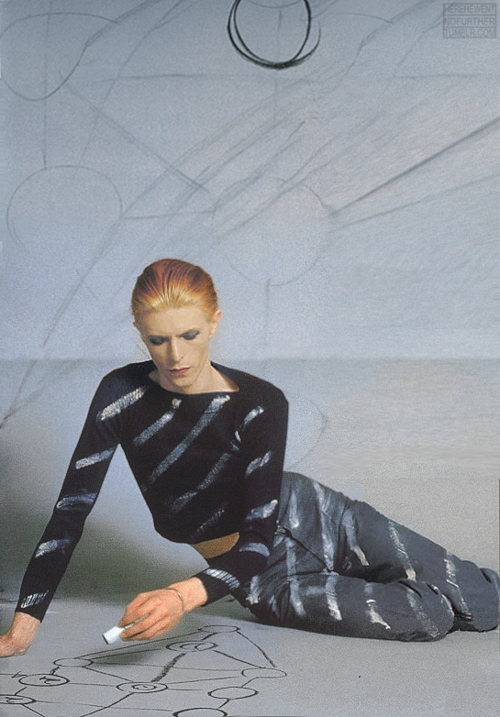Among the many high points in David Bowie’s catalog, “Station To Station” stands as one of his most epic compositions. Written when Bowie’s life was at its most fractured point– having split with his longtime manager, suffering from cocaine psychosis and obsessed with the occult, “Station To Station” transcends the insanity to become one of his most monumental works.
This episode, we’re taking a deep dive into the live version of “Station To Station” from the 1978 Isolar II Tour, as captured on the Stage live album featuring brilliant guitar work from Adrian Belew.

David Bowie, circa 1976, drawing the Tree Of Life, a mystical
diagram referred to in “Station To Station”
TRANSCRIPT:
Put on your red shoes and dance the blues– It’s time for another episode of the “I’m In Love With That Song” podcast. Today, we’re taking a deep dive into “Station To Station” by David Bowie.
Hi, I’m Brad Page, and on this podcast, I pick one of my favorite songs and we spend some quality time listening– really listening– to all the nuances and details that make it a great song. No musical knowledge is required here, we’re not getting into music theory. I’m more interested in arrangements, performances and production– the craft and design that goes into making a great piece of music. And this time we’ve got an amazing piece of music. One of David Bowie’s masterpieces: “Station To Station”.
So, I’m going to do something a little different this time; we’re going to listen to the live version of this song, rather than the studio version. Most people would consider the studio version to be the definitive version, and I’m not going to disagree with that, but I just really love this particular live version, partly because it features two of my favorite musicians: Roger Powell from Utopia on keyboards, and the amazing guitar player, Adrian Belew.
This version is from the album called “Stage”, released in 1978 and culled from performances in Philadelphia, Providence, Rhode island and Boston, Massachusetts, from the ‘78 tour. Along with Adrian Belew and Roger Powell, the band includes Sean Mayes on piano, Simon House on violin, and three guys who had become Bowie’s go-to rhythm section on the last few albums, George Murray on bass, Dennis Davis on drums, and Carlos Alamar on rhythm guitar. Alamar was more than just a rhythm guitarist, he was Bowie’s band leader and defacto musical director during this period.
The song begins with the sound of a steam train pulling out of the station, picking up speed and moving faster. The sound slowly moves from right to left.
On the original studio recording, Bowie used recordings of an actual train and then manipulated them in the studio. But here, live in concert, Roger Powell coaxes the train sounds out of his synthesizer.
The song doesn’t actually have anything to do with trains or train stations, but the sound of the train could be taken as a metaphor for the spiritual journey that the song is about to take us on
The train sounds build for over a minute before Adrian Belew’s guitar appears, mimicking the sound of a train whistle.
And then the guitar starts to go nuts.
A piano enters, ticking back and forth between two notes.
The guitar is really interesting here, as Adrian somehow wrangles sounds out of it that are more like an out-of-control machine than a guitar.
Two minutes into the song, and the rest of the band comes in. Listen to the crazy stuff Adrian is doing with his guitar. That’s why I love this version of the song.
The first time I heard this was a video clip. I think it was on “Don Kirschner’s Rock Concert”. I’d never seen or heard of Adrian Belew before, but his performance here made a huge impression on me. What he’s able to do with his guitar here is incredible.
The heaviness of the guitar is offset a bit by the groove, courtesy of Alamar, Murray and Davis, all seasoned R&B players.
Finally, three minutes into the song, the chaos subsides and Bowie enters with his vocals for the first time.
“One magical moment, such is the stuff where dreams are woven” — that’s a pretty clear reference to a line from the Shakespeare play “The Tempest”, where there’s a line that reads, “we are such stuff as dreams are made of” in the play. That line is spoken by a character named Prospero, who is both a powerful magician and a duke.
This is the first of many references in this song to magic and the occult.
You won’t hear Simon House’s violin much at all in this song. He spends most of the song playing the violin pizzicato; that’s when you pluck the string with your finger rather than using the bow. You can just about hear it in this section.
So that line there: “Here we are, one magical movement from Kether to Malkuth”.
Let’s take a look at that line for a minute. Kether and Malkuth are terms that come from the Kabbalah, an ancient form of jewish mysticism. According to the wisdom of Kabbalah, the tree of life is a mystical diagram where Kether sits at the top, representing pure consciousness and absolute compassion. Malkuth is at the bottom of the tree of life, representing the material world. Now, I’m definitely no scholar of this stuff, so I’m simplifying here, but Bowie had a particular obsession with this stuff during 1976 when he was writing this.
Check out how the bass, keyboards and violin all hit the same riff here.
“There are you, you drive like a demon from station to station”; yet another magical, mystical reference. The stations could refer to the stations of the cross or the positions along the tree of life.
“White Stains” is an obscure book of poetry written by Alastair Crowley, published under the pseudonym George Archibald Bishop. Crowley, of course, is probably the most famous occult figure in history. Most of the poems in “White Stains” involve sex in one way or another, and Crowley and his disciples also had an interest in the Tree of Life. Musically, here, I like the way the guitars arpeggiate the chords like a retro 1950s song.
Now, five minutes into the song, we reach the bridge. The tempo speeds up and the lyrics start to look back with longing. “Some time in the past, once there were mountains on mountains and once there were sunbirds to soar with, and once I could never be down.”
Bowie is clearly on a spiritual journey here as he sings, “Got to keep searching and searching and what will I be believing and who will connect me with love”.
The next few lines will descend in pitch, and then be punctuated with rapid fire chord changes and some rhythmic changes as well. This all creates a sense of disorientation and keeps you off balance.
Then very quickly, the song normalizes to a straightforward four four groove and hits a much faster tempo that will drive us through to the finish of the song.
He begins by singing, “It’s not the side effects of the cocaine, I’m thinking that it must be love”… Well, by this point in Bowie’s career, he was living like a vampire in Hollywood; he was barely eating, living on a diet of cocaine, cigarettes and milk. He would go five or six nights without sleep. He was paranoid, delusional and experiencing hallucinations. Cocaine psychosis. By the time this live version was recorded in 1978, he was in better condition, but when he wrote the song in ‘76, he was in terrible shape. So I’m going to say, yeah, it probably was the side effects of the cocaine.
“It’s too late to be grateful, it’s too late to be late again, it’s too late to be hateful, the European canon is here.”
Now, that last line is interesting, because the word “canon”, that word has two meanings, depending on how you spell it. And I’ve seen it written both ways in transcriptions of the lyrics. C-A-N-N-O-N as in the thing you shoot cannonballs out of, and C-A-N-O-N as in a set of rules, principles, or a list of sacred texts that are seen as genuine or definitive. I think that’s the word that Bowie’s going for here, the “European canon”.
After finishing the “Station To Station” album, Bowie packed up and left Hollywood for Germany, settling in Berlin, where he pulled himself together and made the next few albums in his career. So in this lyric, I think he’s looking towards the sounds coming from Europe as his way forward. Working with Brian Eno and drawing inspiration from bands like Kraftwerk would shape Bowie’s sound for the next few years.
Listen to George Murray’s bass part. All through this section, he is really smoking.
Adrian Belew gets another chance to tear it up, this time with a more traditional guitar solo.
The whole band is really cooking here, and the backing vocals give David something to bounce off of.
This is a great drum fill.
Check out the descending run on the bass guitar here.
And then the party’s over. And again, listen to George Murray’s bass guitar. What he’s playing is simple but interesting.
David Bowie – “Station To Station”, Live 1978
“Station To Station” was the longest song David Bowie ever recorded. And not coincidentally, this is the longest episode of this podcast that I’ve ever recorded. But the song is an epic, with lots of elements to chew on. So thanks for sticking around. I think this song was worth the time.
Over a lifetime in the music business, with dozens and dozens of albums, many high watermarks, and iconic songs that have influenced generations of musicians and artists, “Station To Station” stands out as one of Bowie’s finest works.
Of course, David Bowie died in 2016, but I gotta tell you, not a week goes by where I find it hard to believe I live in a world where there’ll be no more new David Bowie music. It breaks my heart, but we have that amazing catalog of Bowie albums, and it’ll have to be enough. If you’re not familiar with his work, please go explore it. There’s so much good stuff in there, including the later half of his career. There’s literally something in his catalog for everyone. Go check it out.
Well, thanks again for listening to this podcast. As always, you can find me at lovethatsongpodcast@gmail.com, or search for the “I’m In Love With That Song” podcast on Facebook. If you like what you hear, please leave a review on iTunes or wherever you listen to the show. And as always, don’t forget to subscribe to the podcast using the podcast player of your choice. That way you never miss an episode.
Now go and listen to the whole song again. Download it, stream it, or buy it from wherever you find great music. Support the music you love.
REFERENCES:
David Bowie
https://www.davidbowie.com/
Adrian Belew
http://www.adrianbelew.net/
Roger Powell (Utopia)
http://www.rogerpowell.com/
Don Kirschner’s Rock Concert
https://www.imdb.com/title/tt0199257/
White Stains by Alastair Crowley
https://www.sacred-texts.com/oto/ws/index.htm
The Tempest by William Shakespeare
https://shakespeare.folger.edu/shakespeares-works/the-tempest/
Kabbalah
https://www.myjewishlearning.com/article/kabbalah/

 Click here to play the podcast
Click here to play the podcast